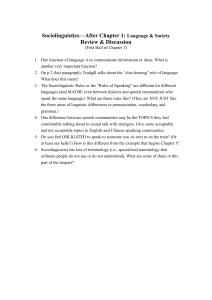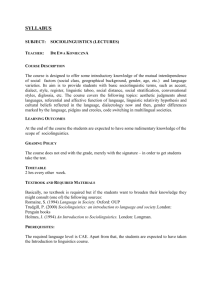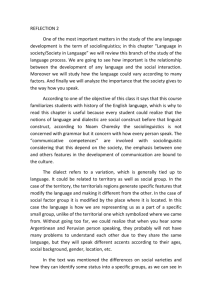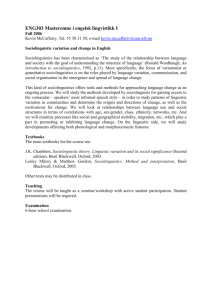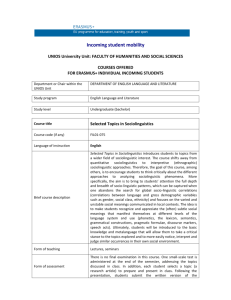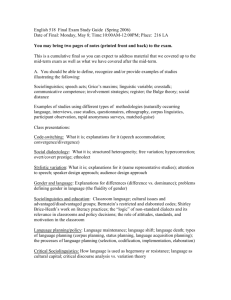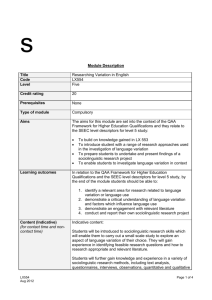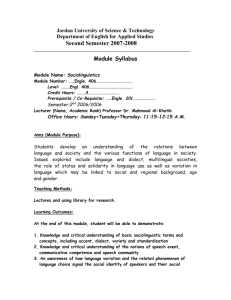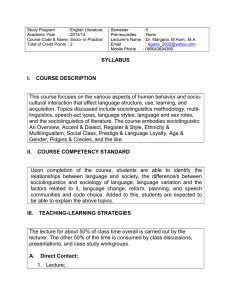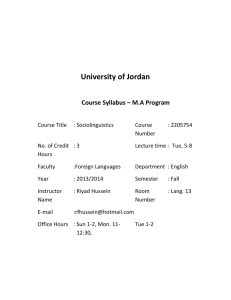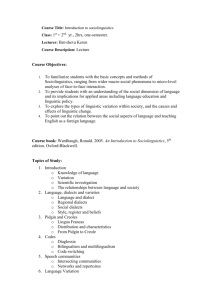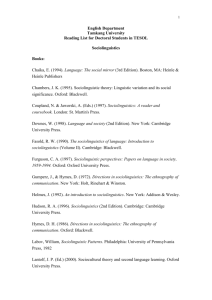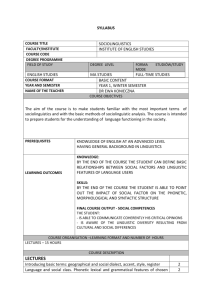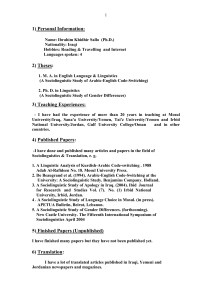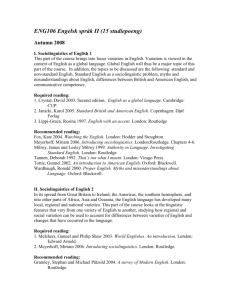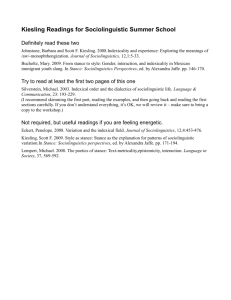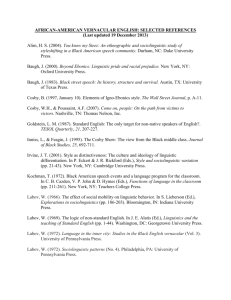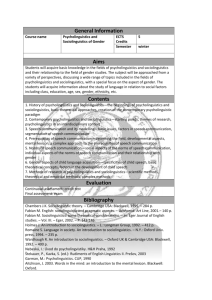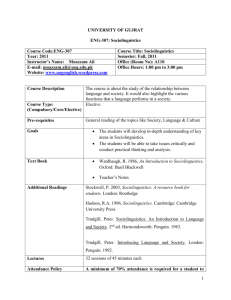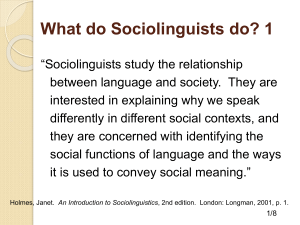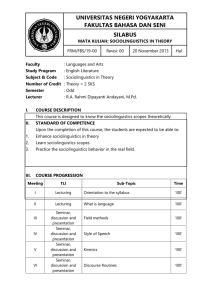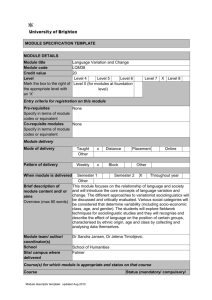University of Kent at Canterbury
advertisement
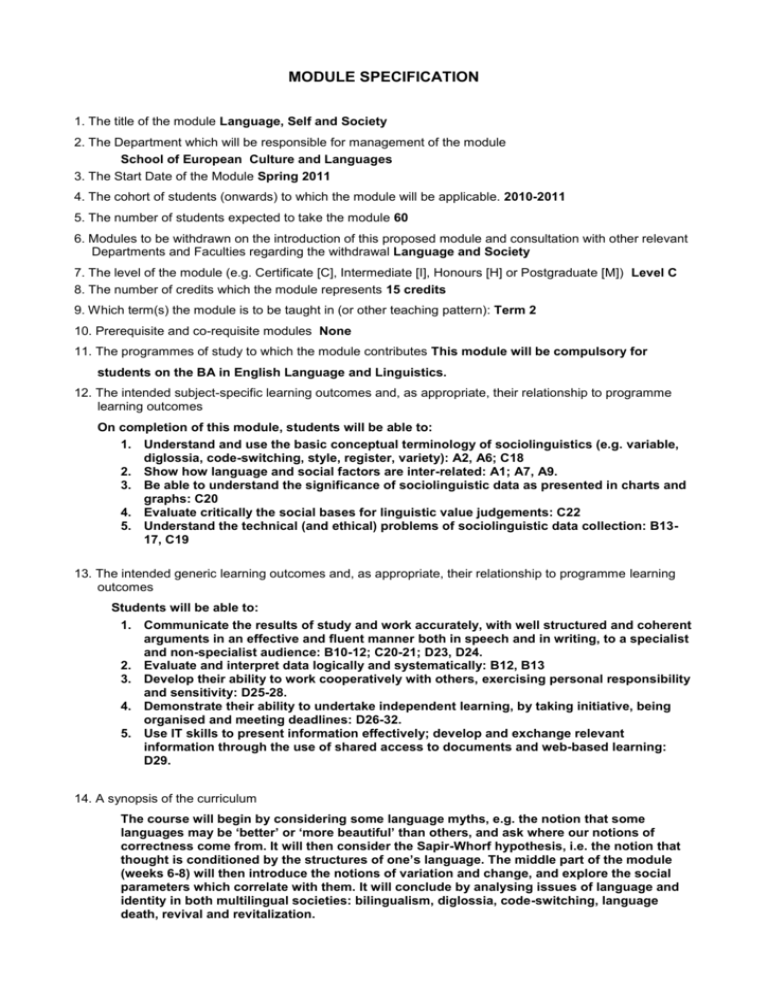
MODULE SPECIFICATION 1. The title of the module Language, Self and Society 2. The Department which will be responsible for management of the module School of European Culture and Languages 3. The Start Date of the Module Spring 2011 4. The cohort of students (onwards) to which the module will be applicable. 2010-2011 5. The number of students expected to take the module 60 6. Modules to be withdrawn on the introduction of this proposed module and consultation with other relevant Departments and Faculties regarding the withdrawal Language and Society 7. The level of the module (e.g. Certificate [C], Intermediate [I], Honours [H] or Postgraduate [M]) Level C 8. The number of credits which the module represents 15 credits 9. Which term(s) the module is to be taught in (or other teaching pattern): Term 2 10. Prerequisite and co-requisite modules None 11. The programmes of study to which the module contributes This module will be compulsory for students on the BA in English Language and Linguistics. 12. The intended subject-specific learning outcomes and, as appropriate, their relationship to programme learning outcomes On completion of this module, students will be able to: 1. Understand and use the basic conceptual terminology of sociolinguistics (e.g. variable, diglossia, code-switching, style, register, variety): A2, A6; C18 2. Show how language and social factors are inter-related: A1; A7, A9. 3. Be able to understand the significance of sociolinguistic data as presented in charts and graphs: C20 4. Evaluate critically the social bases for linguistic value judgements: C22 5. Understand the technical (and ethical) problems of sociolinguistic data collection: B1317, C19 13. The intended generic learning outcomes and, as appropriate, their relationship to programme learning outcomes Students will be able to: 1. Communicate the results of study and work accurately, with well structured and coherent arguments in an effective and fluent manner both in speech and in writing, to a specialist and non-specialist audience: B10-12; C20-21; D23, D24. 2. Evaluate and interpret data logically and systematically: B12, B13 3. Develop their ability to work cooperatively with others, exercising personal responsibility and sensitivity: D25-28. 4. Demonstrate their ability to undertake independent learning, by taking initiative, being organised and meeting deadlines: D26-32. 5. Use IT skills to present information effectively; develop and exchange relevant information through the use of shared access to documents and web-based learning: D29. 14. A synopsis of the curriculum The course will begin by considering some language myths, e.g. the notion that some languages may be ‘better’ or ‘more beautiful’ than others, and ask where our notions of correctness come from. It will then consider the Sapir-Whorf hypothesis, i.e. the notion that thought is conditioned by the structures of one’s language. The middle part of the module (weeks 6-8) will then introduce the notions of variation and change, and explore the social parameters which correlate with them. It will conclude by analysing issues of language and identity in both multilingual societies: bilingualism, diglossia, code-switching, language death, revival and revitalization. 15. Indicative Reading List Blake, B. (2008) All About Language. Oxford: Oxford University Press. Fasold, R. (1990) The Sociolinguistics of Society. Oxford: Blackwell. Labov, W. (1972) Sociolinguistic Patterns. Oxford: Blackwell. Wardhaugh, R. (2005) An Introduction to Sociolinguistics. Oxford: Blackwell Trudgill, P. (2005) Sociolinguistics. Harmondsworth: Penguin. 16. Learning and Teaching Methods, including the nature and number of contact hours and the total study hours which will be expected of students, and how these relate to achievement of the intended learning outcomes This module will be taught in two sessions, consisting of a 1-hour lecture and a 1-hour seminar. The lecture will address key concepts in sociolinguistics (learning outcomes 1-4) while the student-led seminar will provide for in-depth practice, exploration and discussion of the topics covered in the lectures (learning outcomes 5-8). Total number of study hours per term: 150 17. Assessment methods and how these relate to testing achievement of the intended learning outcomes Coursework plus examination, weighted as below: (a) 1500-word Essay (30%) (b) Presentation (10%) (c) 2-hour examination (60%) For the essay, students will be given a choice of 8-10 questions based on specific issues covered in seminars. The presentation may be undertaken individually or in small groups of 2-3 students; in the latter case, the mark will be shared between participants, but the course convenor reserves the right to raise the mark for this element where seminar performance generally in the term (e.g. asking questions of other presenters or the seminar leader, contributing to or leading discussion) has been exceptional. The examination will consist of 2 questions from 7 or 8 on topics discussed during the term and general issues raised by the module. 18. Implications for learning resources, including staff, library, IT and space No major implications. 19. A statement confirming that, as far as can be reasonably anticipated, the curriculum, learning and teaching methods and forms of assessment do not present any non-justifiable disadvantage to students with disabilities The School of European Culture and Languages is committed to actively fostering an inclusive community within the classroom. We have enabled students with physical disabilities, sensory impairments and learning difficulties to play a full part in the curriculum of our programmes. Such support has taken the form of assisted note-taking and alternative assessment formats. We will continue to work together with individual students and the Disability Support Unit to identify strategy aids and assess needs in order to provide educational support. Statement by the School Director of Learning and Teaching/School Director of Graduate Studies (as appropriate): "I confirm I have been consulted on the above module proposal and have given advice on the correct procedures and required content of module proposals" ................................................................ Director of Learning and Teaching/Director of Graduate .............................................. Date Studies (delete as applicable) ………………………………………………… Print Name Statement by the Head of School: "I confirm that the School has approved the introduction of the module and, where the module is proposed by School staff, will be responsible for its resourcing" ................................................................. Head of School ……………………………………………………. Print Name .............................................. Date
